The Journals of Ayn Rand Read online
Page 4
Howard Kane’s building is finished. Only the wooden scaffolding that surrounds it still remains to be removed. The proud skyscraper towers over Broadway, before the admiring eyes of the [people below].
Howard must return to jail that evening, for his bond has expired with the completion of his work. Alone in the building, he is taking a last look at it.
Danny Day is going to her wedding, for this is her wedding day. She is riding in an automobile through New York’s streets. She cannot tear her eyes from the automobile’s window. Above the roofs of the small houses, she sees in the distance Howard Kane’s skyscraper. It appears behind every corner, in every opening between the houses. It seems to follow her. She cannot stand it. She gets out of the car and runs. But the skyscraper is still there, before her. She loves the buildings of Broadway. She feels so small and helpless at their feet. She feels for the first time all the majesty of the world’s greatest structures. And she is drawn irresistibly toward Howard’s skyscraper.
She comes to the building and meets Howard. Both cannot hide their love any longer. But they have to part. Howard goes to Mr. Clark to say farewell.
Mr. Clark, however, has another plan. He tells Howard that he is so grateful for his work that he is willing to lose the bond money and he asks him to run away. Howard agrees.
Meanwhile, John Scott calls Tom Riggins. He is furious that the building has been finished on time. He bribes Riggins to set fire to the wooden scaffolding. And Riggins does it.
Howard and Danny are riding away in an automobile. They hear the newsboy shout about the police searching for the escaped Howard Kane. Then suddenly they see a red glow that sets the sky aflame and they see the burning skyscraper. Howard wants to save it. Danny implores him not to give himself up and to run away. But he rushes to his building.
The skyscraper is a blazing tower of flames. The firemen are unable to stop the fire. The water hoses are helpless before the 700-foot-high flaming monster. An immense crowd is gathered before the tremendous spectacle.
Policemen rush to Howard when they see him. But he runs to the building and starts climbing up, through the flames, to the water tower on top. He rises through the fire, climbing, falling, climbing again. It seems that all of New York is watching him breathlessly.
Meanwhile, Tom Riggins is arrested, for he is suspected. He is terrified and announces that John Scott is guilty of the fire, as well as the first catastrophe at the building.
Howard reaches the water tower at the top. He releases the water. The building is saved.
Far below, the crowd is cheering wildly for Howard Kane, the hero. The skyscraper rises in the night like a victorious white column. His clothes, hanging in rags, his body burned and bleeding, Howard Kane is standing on top of his building, his head thrown back—just a man looking at the sky.
[DeMille did produce The Skyscraper in 1928, starring William Boyd and Alan Hale. The movie followed the original story, not AR’s scenario; according to AR, “it was a lousy picture. ”]
[The following notes were written in Russian.]
An epic:1. Spans an entire epoch.
2. Has a large theme, a grand theme—and an enormous conflict (external or internal).
3. Exhausts and integrates everything related to the theme; it represents the essence, in the best possible form.
4. A concrete story expresses the universal essence; it is not an exceptional occurrence.
5. The story applies to everyone, not just to an individual soul.
How it is expressed:1. Expresses various main ideals, ideas, and events of a given epoch.
2. A large theme, closely related to the epoch’s character.
3. The most interesting, universal traits and facts are expressed in the most [illegible], interesting, and characteristic story.
4. A concrete story is built in such a way as to express the idea, the universal traits, in the most colorful way.
5. Do not push the hero into the foreground too much, do not express everything only from the hero’s point of view and as being for the hero; implicitly let it be felt that the hero is a means, not the end.
6. The plot [should] express and unite everything, all the concretes. The plot flows from the essence of the theme; one constructs the plot after analyzing the theme, the epoch.
[The following is the second complete scenario. In order not to give away the story, I have omitted one page of plot notes.]
The Siege
Ellen Darrow, her millionaire father Mr. Darrow, and her fiancé Dick Saunders are paying their last visit to Peking. The American Consul, their friend, advises them to leave China as soon as possible, for it is dangerous for foreigners to stay there with all the disorders and insurrections.
Ellen has been noticed by a Chinaman of bad reputation, Jung-Tzan, who had seen her in a restaurant. She has been saved from him by the two Americans, who were present there. Mr. Darrow is very nervous and promises the Consul that they will leave tomorrow.
They return to their hotel to spend the last night there. This hotel is a strong building, reminiscent of a Chinese castle. It is situated in a picturesque but lonely spot among rivers and woods, miles from Peking. The manager is a European and the residents are all Americans and Europeans, a very exclusive crowd of society people. The only Chinaman in the place is the janitor.
That night, when the lights of the hotel go out, a young American, Kenneth Hartley, slips into the building through an open window. He isn’t a resident of the place. He’s just a crook and his aim is the safe in Mr. Darrow’s room.
He is opening the safe when Ellen, in her room upstairs, hears the noise. She rushes downstairs, revolver in hand, and stops Kenneth just as he had opened the safe. Mr. Darrow and Dick Saunders arrive at her call. Kenneth is disarmed. Dick is about to put handcuffs on him, when they hear shots outside and a loud knocking at the door.
The hotel is surrounded by a mob of Chinese bandits led by Jung-Tzan, Ellen’s enemy. The terrified hotel guests are in a mad panic. They don’t know what to do and are too frightened to act. The only man that realizes the position is Kenneth.
In a few moments he organizes the defense of the hotel. All of the doors are strong iron and most of the windows have iron bars and shutters. The residents have quite a big supply of firearms. Kenneth assigns a post to every man in the place.
The Chinese mob attacks the hotel and the attack is forced back by the hotel guests, under Kenneth’s orders. Knowing that they can’t hold for a long time, Jung-Tzan orders his bandits to remain around the building in a regular siege. He had previously cut off all the hotel’s telephone wires. There isn’t a living soul for miles around. He knows that the place is in his power, with all the money, jewels, and women in it.
A few days pass. Kenneth is the supreme chief and dictator of the besieged hotel. He leads the defense and the helpless society people know that their lives are in his hands. There is not much food nor many weapons in the place for a long siege and Kenneth manages it, spending as little as possible.
Dick Saunders is very drunk and jealous, for he notices a growing friendship between Ellen and Kenneth. After one of the Chinese attacks, Kenneth is slightly wounded and Ellen bandages his wound. During that battle Ellen has seen and recognized the Chinese chief, and it adds to the anxiety of Mr. Darrow, her father.
That night, Kenneth is watching over the hotel and surveying the Chinese camp. All seems quiet, when he suddenly sees two Chinamen climbing up the old stone wall towards Ellen’s window. He rushes to Ellen’s room and enters it noiselessly. Ellen is asleep. For a moment he looks at her, forgetting the enemies and everything. Then, mastering himself, he goes to the window and shoots at the Chinamen, just as they are approaching. One is killed; the other—Jung-Tzan—runs away.
Ellen wakes up and runs to Kenneth in terror. Then she realizes that she is in his arms and steps away from him, just as her father and Dick rush in.
The next morning, Kenneth finds a strange letter in his room. It is from Jung-Tzan. The Chinese chief tells Kenneth that he is the only one they fear and offers him a big sum of money for surrendering the place. Kenneth throws the letter away disdainfully, wondering how it got there.
That day, while putting iron bars on the window in Ellen’s room, Kenneth sees Ellen and, forgetting himself, tries to take her in his arms. She tears herself from him. She does not speak to him that day, and tries to be especially tender to her fiancé, Dick Saunders, as though to convince herself that she still loves him. Kenneth is dark and silent, tortured by jealousy.
The hotel guests notice it all. It worries them, and their worry changes to terror when one of them finds Jung-Tzan’s letter in Kenneth’s room. They are afraid that Kenneth will betray them. They call Ellen. They ask her to pretend to love Kenneth, to prevent him from surrendering the hotel. Ellen is indignant. But they all plead with her, asking her sacrifice to save them from a terrible fate. Even Dick Saunders does not object to it.
Ellen agrees at last. She tries to convince herself that her task is more disagreeable to her than she really feels it is.
Meanwhile, as a last hope, Mr. Darrow decides to send the Chinese janitor to Peking, hoping that he might be able to slip through the Chinese lines and inform the American Consul. The janitor is let out through a little side door.
In a short time, Ellen has conquered Kenneth. And when she is in his arms, when she loves him, she is afraid that she is not playing a part. But she does not want to admit it to herself.
Kenneth asks her to marry him right away, for he wants her and they cannot be sure of the future, with the terrible danger hanging over them. Ellen struggles with herself, then agrees.
Mr. Darrow has to agree, too. Kenneth is radiant with happiness and tells them that he is going straight
forever.
There is a priest among the hotel residents. Everything is ready for the wedding. The ceremony is about to start when there is a knock at the little door. The janitor returns. He announces that he has informed the Consul and American soldiers are on their way to the hotel: they will be there in a couple of hours.
A roar of enthusiasm greets the news. Dick Saunders stops the wedding, says that Ellen does not have to play the part anymore. Ellen wants to protest, but cannot, for Kenneth is stricken with the discovery of her deception.
And the guests’ attitude toward Kenneth changes. They don’t need him anymore. They are mocking and disdainful. To them, he is the crook again. They even put handcuffs on him, but Ellen takes them off. Kenneth is too stricken to protest or say anything.
Some of the guests run to the roof of the building and fire their last bullets into the air, as a signal to the coming soldiers.
Kenneth is alone in a dark comer when the janitor approaches him. The janitor is laughing triumphantly. He tells Kenneth that he is in Jung-Tzan’s service and the news is a fake, nobody is coming to the rescue, but that Jung-Tzan’s offer to Kenneth is still good and maybe he will accept it, now that he sees how his people have treated him.
Kenneth runs to the cellar; there is no food left and hardly any bullets. He returns to the janitor and tells him to bring Jung-Tzan in secretly through the little side door to discuss his offer.
Jung-Tzan comes. Kenneth says that he will agree to open the doors to him, under two conditions: first, Kenneth will be the master and the Chinese will obey his orders; second, the woman, Ellen Darrow, will belong to him. Jung-Tzan hesitates, but finally agrees.
In the evening, the hotel guests are all dressed in their best evening clothes, waiting for the soldiers, when Kenneth opens the doors and lets the Chinese mob in. It is a terrible scene. At Kenneth’s orders the guests are all made prisoners in a few moments. They are horrified at Kenneth’s betrayal, which seems so hideous. Kenneth orders them all to be locked in the hotel’s cellar and the key brought to him.
Ellen is the only one that is not locked. He takes her to his room. She struggles desperately, but he drags her roughly up the stairs, while the Chinamen laugh.
When they are alone in his room, Kenneth tells her that he brought her here only because he could not trust Jung-Tzan. He explains that this was the only way to save them all. He is going to let them all escape, in two of the Chinese trucks, while he will remain here and keep the Chinese from following them.
Ellen is horrified. She does not want him to remain. She tells him how much she loves him and they have a sincere love scene this time. But Kenneth has to remain to save the others. While the wild Chinese mob is robbing the house, breaking the safes and drinking the remaining wine, Kenneth leads all the prisoners to two trucks, parked in a lonely, dark spot, and they speed away. He remains.
He does all he can to keep the Chinamen from going into the cellar. He drinks with them and tries to amuse them. Then Jung-Tzan suggests that they must prepare tortures for the prisoners. Kenneth tries to keep them at it as long as possible, inventing more and more tortures, but knowing that he is the only one on whom they will be used.
Finally, they grow impatient. He tells them that he has lost the cellar key. They go downstairs, they break the door. The cellar is empty.
They rush to Kenneth. He faces them with a calm [expression].
The hotel guests reach Peking. Mr. Darrow asks for American soldiers to be sent to the hotel immediately. He and Ellen go back to the hotel with them.
Taken by surprise, the Chinese mob in the hotel surrenders immediately. Ellen runs madly through the rooms, searching for Kenneth. She finds him at last, tied to a torture machine, but still alive.
circa February 1928
In 1928, at the age of twenty-three, AR made her first attempt in English to plan a novel. The working title was The Little Street.
Its theme is that humanity—warped by a corrupt philosophy—is destroying the best in man for the sake of enshrining mediocrity. By far AR’s most malevolent story, it provides a sharp contrast to the “benevolent universe” of the earlier scenarios, in which the hero is victorious. Here she is bitterly denouncing a world that seems to have no place for heroism.
Later, AR emphatically rejected the “malevolent universe” premise that evil is powerful and the good helpless. But the premise does dominate The Little Street. What kind of factors may have led her temporarily to accept it?
She grew up in Russia, a man-made model of a malevolent universe (see We the Living). Then, in America, she was astonished to discover that the same anti-life ideas that had destroyed Russia were on the rise here. The result seems to have been periods ofprofound indignation, when AR felt that the whole world was dominated by evil and that she was a metaphysical outcast. It is from this perspective that the story was conceived.
In her mature writings, AR stressed that she advocated rational selfishness, not the whim-worshipping subjectivism of the man who says: “The good is whatever I want. ” She regarded the whim-worshipper with particular contempt, arguing that such a man entirely lacks the virtue of selfishness (see “Selfishness Without a Self” in Philosophy: Who Needs It). But in the following notes, AR is focused on a single question: whether a man is motivated to act for himself or for others—and not on the epistemological issue of whether he acts by reason or whim. Consequently, she praises any expression of egoism, even when it seems to be the pseudo-egoism she would soon begin to denounce.
Furthermore, AR has not yet distinguished clearly between the independent man and the man who seeks power over others (e.g., between a man like Howard Roark and one like Gail Wynand). She writes admiringly of the strong individual who wants to “command, ” rather than “obey. ” Later she recognized that such a choice is a false alternative: “The choice is not self-sacrifice or domination. The choice is independence or dependence. ” The notes for The Little Street were written nearly eight years before she began work on The Fountainhead.
Occasionally, AR describes certain fundamental attitudes or character traits as “innate” “ (e.g., her hero’s innate egoism). These passages contradict her advocacy of free-will; it might appear that AR believed in some form of biological determinism. In fact, even in these early notes, her dominant premise is that men are responsible for the ideas they choose to accept and the actions they choose to take. For example, she cites the ideas that have led to the moral corruption in the world, and her implication throughout is that men can choose to accept these ideas or not. She is inconsistent in this story, because she does not yet see the contradiction between free-will and innate virtues.
All of the above confusions reflect the influence on the early AR of Friedrich Nietzsche, whom she had read and admired, especially for his eloquent expression of a heroic sense of life. There are several references to him in these notes. In due course, however, she discarded all these Nietzschean elements, and defined “heroism ” in rational terms, by reference to her own distinctive philosophy of Objectivism. For her final view of Nietzsche, see the introduction to the twenty-fifth anniversary edition of The Fountainhead and the title essay in For the New Intellectual.
Despite the flawed statements, it is easy to recognize AR as the author of the following notes. Her trademark—the reverence with which she regards man’s life, her intense passion for values—comes through clearly. In its combination of value-passion and moral indignation, The Little Street is similar to AR’s early screenplay Ideal (see The Early Ayn Rand).
The notes also include AR’s earliest formulations on several key topics: her sense of life; the unity of thought and feeling which is experienced by a “clear mind”; the effect of the morality of sacrifice on self-esteem and moral ambition; moral compromise as an unmitigated evil; the motivation ofa soul who insists that the meaning of one’s life is to be found outside oneself.
At the age of twenty-three, AR knew that she was not ready to portray her ideal man. Her goal here is less ambitious; she wants only to project her ideal man’s sense of life. The protagonist, Danny Renahan, is an independent, uncompromising, nineteen-year-old boy with a passionate hunger for life. Some of Danny’s characteristics are based on an actual nineteen-year-old boy, William Edward Hickman, who was the defendant in a highly publicized murder trial that had just taken place in Los Angeles. Hickman was accused of kidnapping and murdering a young girl. He was found guilty and sentenced to death in February of 1928; he was hanged on October 20, 1928.

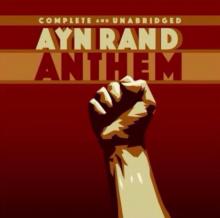 Anthem
Anthem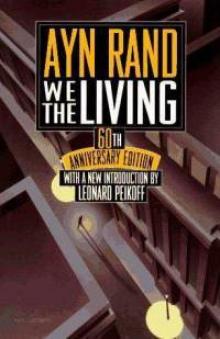 We the Living
We the Living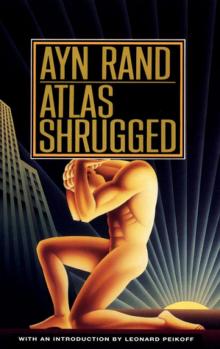 Atlas Shrugged
Atlas Shrugged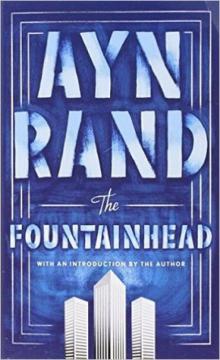 The Fountainhead
The Fountainhead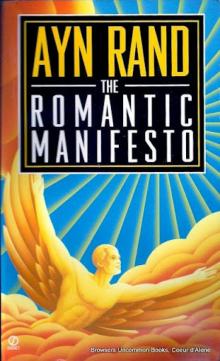 The Romantic Manifesto: A Philosophy of Literature
The Romantic Manifesto: A Philosophy of Literature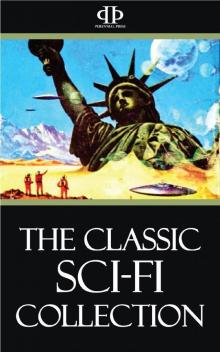 The Classic Sci-Fi Collection
The Classic Sci-Fi Collection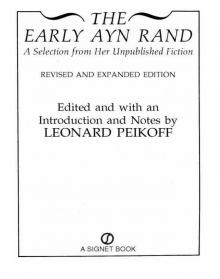 The Early Ayn Rand
The Early Ayn Rand